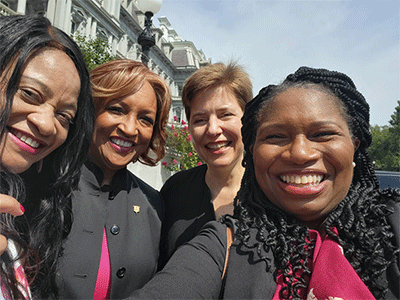The National Council of Churches (NCC) was invited this week to a White House Roundtable with Faith Leaders on the Overdose Crisis, hosted by Dr. Rahul Gupta, Director of the Office of National Drug Control Policy, and Steven Benjamin, Director of the White House Office of Public Engagement and former mayor of Columbia, S.C. Also providing leadership was Melissa Rogers, Executive Director of the White House Office of Faith and Neighborhood Partnerships, and the Rev. Que English, Ph.D., Director of Faith-Based Neighborhood Partnerships one the Department of Health and Human Services.
The National Council of Churches is an ecumenical partner supported by the Interdenominational Cooperation Fund apportionment, which enables United Methodists to share a presence and a voice in the activities of several national and worldwide ecumenical organizations.

Representing NCC were Bishop Vashti Murphy McKenzie, President and General Secretary, and Rev. Dr. Leslie Copeland Tune, Chief Operating Officer. Each of the 11 organizations represented was asked to share from a list of five questions, ranging from policies, direct services, challenges, and barriers, to saving lives from opioid overdose and the role of their specific faith community.
In her remarks, Bishop McKenzie highlighted the work of NCC member communions — including the United Methodist Church, the Episcopal Church, the United Church of Christ, and the Presbyterian Church — in her presentation about success stories. Several NCC communions provide resources to congregations to address opioid use and overdose with compassion. Others encourage congregations to use their facilities for providing services in underserved rural areas, or partner with local responders and medical communities to offer pastoral care to those impacted by this epidemic, and collaborate with other faith leaders.
She also shared insights from Rev. Dr. Barry Steiner, a United Methodist minister who has developed ministry programs that address the opioid crisis.
Bishop McKenzie cited the NCC’s work in ending mass incarceration and the revival of NCC’s Health and Wellness Taskforce. A 2019 report indicated that opioid use was frequently a factor in arrest and inmate intake. One report noted that 14.5 of persons tested positive for opioid use during the inmate intake process, making such drug use a factor in ending mass incarceration. NCC’s revitalized health initiative is focused on mental health.
Dr. Gupta observed that mental health was a factor in each of the presentations.
“Faith communities have an opportunity to chip away at the stigma of opioid abuse and overdose, which not only impacts the lives of those who are caught in the vise of prescription drug abuse, but also their families who often suffer in silence, along with the broader community,” Bishop McKenzie said. “Church is an excellent place to learn about relationship — your relationship with God, relationships with each other, and techniques to repair relationships. The church can be a connector that helps people reenter into community as we learn to change the question from “What’s wrong with you?” to “What happened to you?”
National Council of Churches website
One of seven apportioned giving opportunities of The United Methodist Church, the Interdenominational Cooperation Fund enables United Methodists to share a presence and a voice in the activities of several national and worldwide ecumenical organizations. Please encourage your leaders and congregations to support the Interdenominational Cooperation Fund apportionment at 100 percent.





